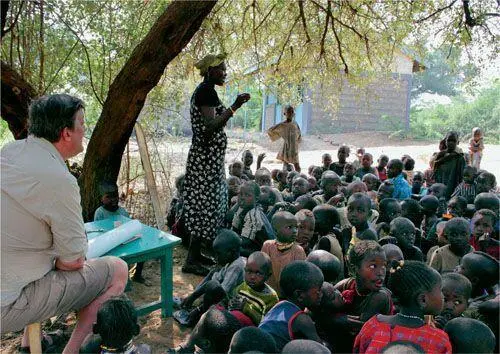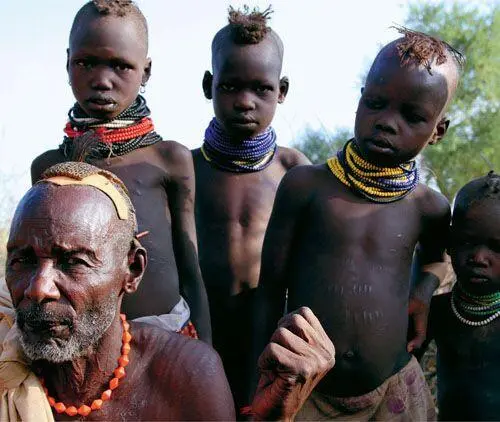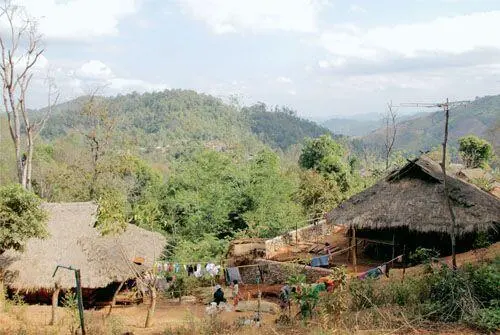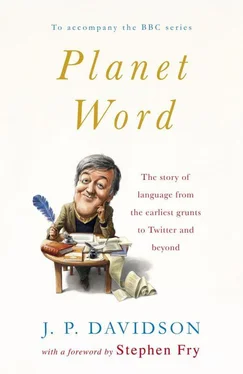For those who remain in their traditional manyattas (villages) the chances to do other than be a pastoral nomad are negligible. For the older generation this is not really a dilemma — they have known no other way of life — but for their children, if they don’t embrace the possibilities of education and the chance to become involved in the wider Kenyan society, they are destined to remain on the periphery. The upside to this is they will retain their language culture and identity, but how long they can withstand the somewhat dubious temptations of ‘progress’ is a moot point.
One of the key factors in preserving the language has been the creation of a script. Thanks mainly to the work of Catholic missionaries like Father Tom, an Irish priest who has been working among the Turkana for nigh on forty years, a standard Turkana orthography has been adopted. It is based on the Roman alphabet and is taught at the mission primary schools. Under the shade of a tree a young teacher gathers her children and, with nothing more than a worn-out blackboard, chalk and the efficacy of using the desert sand as a slate substitute, the children practise writing Turkana. The eagerness with which the young Turkana sing out the vowels and write them down is an inspiring sight. However, unless their language is adopted by the state system it seems it is never going to provide a realistic alternative to Swahili.

Turkana children learn to write by drawing in the sand
The manyatta is a world apart from the relative sophistication of Loki, a half day’s walk away. To the west you can see the outline of the Kidopo mountains, which form the border with Uganda and were made famous in the 1970s by director Peter Brook’s play based on the Ik, the tribe that live there. Five miles north across the flat scrub desert lies the border with Sudan (or whatever the new state of Southern Sudan will be called). The fact that Southern Sudan has effectively abrogated the colonial borders and seceded from the very idea of Sudan is indicative of the looseness of nation-state identity in parts of Africa. Tribalism rules. This is an unforgiving landscape, where tribal and clan loyalties are paramount, and the only way to assert security and independence from larger forces is to be united. Language is, as ever, the key to this sense of belonging.
The manyatta itself is almost invisible from a distance: a scattering of thorn-bush enclosures for the livestock and domed huts made of bendy boughs and stretched animal skins that seem to have grown out of the earth, which of course they have. The giveaway signs are the bleets, baahs and moos of a few hundred quadrupeds and the waft of animal urine from the enclosures.
The young men here have no intention of giving up their traditional way of life, which means basically cattle raiding. The notion that there is anything more important than Turkanaland and the Turkana language and customs is clearly unthinkable. Cedrac Ekitela is a strikingly handsome warrior who seems to have some authority even in this fiercely consensual society. He has the additional status of being the proud owner of a shiny blue mobile phone, and to add to his skills, speaks passable Swahili with a smattering of English. He explains that to express concepts such as Akuj, their supreme god and bringer of rain, or to sing the naleyo , which honours their emong , a special ox who becomes like an avatar to the warrior, would be impossible in any other language. Turkana is unusually rich in mythology and songs, and it is this inner part of the Turkana which no other language can reach. Anyone watching them perform these ritual songs and dances would see that their language is their culture.
Early explorers and British administrators must have felt intimidated when confronted by these uncompromising warrior people. It is this that will undoubtedly help them preserve their language and traditions more than anything else; and their half a million plus numbers — relatively substantial by Kenyan standards — will ensure they have enough weight to protect themselves not only from the neighbouring tribes but also political intrusions from Nairobi.
Their unique voice and vision of the world should not be lost.

Turkana traditions will hopefully be around for years to come
Turkana Origin of Stars Myth
A taboo is broken. Akuj, the bringer of rain, is angry and covers the world in darkness with his cloak. The Turkana warriors all get together and with their spears lift up Akuj’s cloak. The spears make tiny tears in the fabric and those holes are the stars that shine at night.
The Akha: the Politics of Language
The Turkana have a good chance of speaking their language in ninety years’ time, but halfway across the world in Thailand a similar sort of story is unfolding which may not have a happy ending.
Chiang Rai is the northernmost province of Thailand, and its eponymous capital is only 60 kilometres from the borders with Burma (Myanmar) and Laos. A great sprawl of shops offering everything from new Volvos to durian fruit line the road north as far as the newly created Mae Fah Lung University, named in honour of the much-loved mother of the present King of Thailand. Beyond the campus area, the shops give way to padi and tobacco fields, and the road begins to climb up through the hills. To an outsider the villages along the road all look much the same, but there are some telltale signs that point to the complex ethnic and historical forces at play here. The occasional flash of a traditional headdress or colourful fabric amid the sea of ubiquitous jeans and T-shirts mark out the Hmong from the Lisu, the Lahu, the Shan or the Wa. These are the main tribes that live in these highlands, which extend north up to Yunnan in China, east across Laos as far as the Annamite range in Vietnam and west to the Salween river in Burma. They all have their own languages and customs, and none of them owes any deep-rooted allegiance to the parent state of which they, by accident of history, find themselves part. It’s a rich ethnographic smorgasbord. The mountains offer both protection and isolation, allowing fascinating and discrete cultures, and of course languages, to develop.

Traditional bamboo houses line the hills
The road finally reaches Kuay Huak Paso, a straggly line of bamboo and concrete houses that line the ridge that separates Thailand from Burma. It is home to one of the many hill tribes of Thailand, the Akha.
Aju is an Akha but he speaks good English, having studied at language school in Oxford. He stayed with the poet James Fenton for a couple of years before returning to Thailand to fight for Akha rights. The Akha are one of the poorest and least developed hill tribes in Thailand, looked down upon by the Thais, and often refused IDs, which means they have little or no access to health and welfare programmes. Aju set up an Akha institute to lobby for these rights and has begun to record the oral traditions of his tribe before they die out. He wants the government to acknowledge that the Akha language, along with other minority hill-tribe languages, has a right to exist and should be helped to survive.
Today, Aju is visiting the village blacksmith’s, where a very rare and important event is about to start, a ritual that even Aju, video recorder of his tribe’s culture, has never witnessed. As the blacksmith begins to fashion a blade from a solid rectangular lump of steel, ably helped by his wiry assistant working a most efficient and excellent bamboo bellows, Aju explains the significance. The elders of the village are about to embark on a three-day verbal marathon, relating the entire Akha genealogy to one of the younger men. Traditionally the Akha have had a purely oral culture — preserving family histories, children’s songs, games and stories by remembering and repeating them from generation to generation. Aju can recite fifty-three generations of his family tree. Not bad. Most of us would be hard pushed to remember four. We have the advantage of history books, diaries, literature to remember both our personal history and that of our culture. For the Akha to lose their language would effectively erase a thousand years of history and render them mute.
Читать дальше















